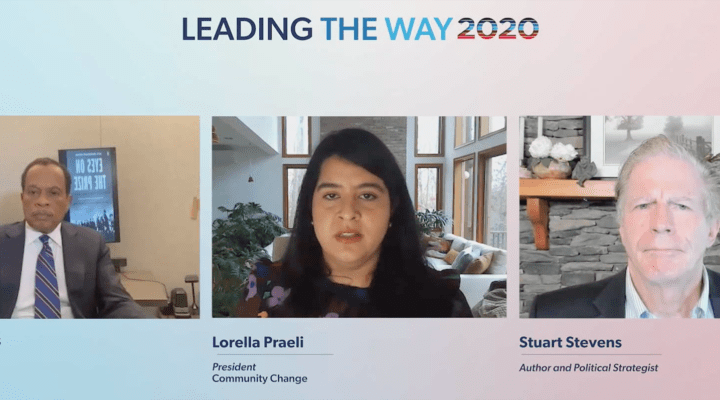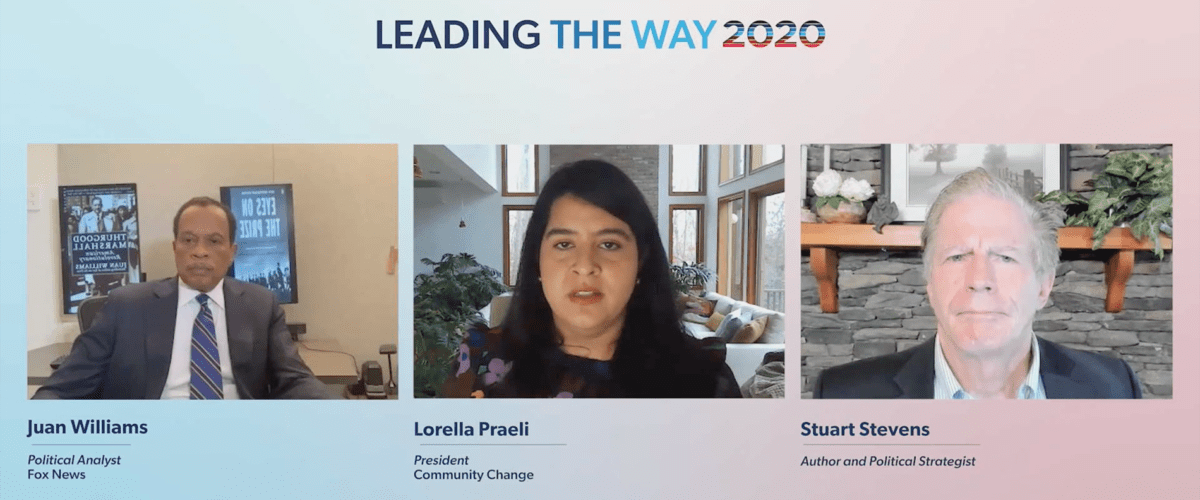The incoming Biden administration has an opportunity to “normalize” immigration policy but may face opposition to some common-sense actions by Republican leaders who still fear Donald Trump’s supporters, according to a bipartisan panel of presenters at the National Immigration Forum.
More than 1,000 people registered for the online event — “Leading the Way 2020” — which began on Monday, Nov. 16, and was slated to run through Nov. 19.
Immigration lines blurred
Historically, Americans — and even Republicans and conservative evangelicals — have understood a difference between “legal” immigration and “illegal” immigration and have thought children brought to the country illegally should have a path to citizenship, noted Robert P. Jones, president of the Public Religion Research Institute, and Tim Miller, writer at large for The Bulwark.

Chavez
But the Trump administration and the policies advanced by senior advisor Stephen Miller blurred the lines between legal and illegal in a quest to end all immigration, the two said in a conversation moderated by Linda Chavez, senior fellow with the National Immigration Forum.
“Trump succeeded in scrambling these distinctions between legal immigration and illegal immigration,” Jones asserted. “His rhetoric has cast them all in the same bucket.” Thus the Trump immigration policy effectively became about “admitting no one.”
That’s despite years of polling that shows widespread support among Americans for legal refugee resettlement programs and for supporting so-called “Dreamers” brought to the U.S. by parents through no illegal action of their own.
“There has always been more than 6 in 10 Americans for allowing a path to citizenship for those in the country illegally as the preferred policy solution,” he said. “That includes half of Republicans and a majority of white evangelicals.”
“Anything that has to do with keeping people out has support from white evangelicals and Republicans.”
However, because the Trump administration has so blurred the lines on immigration, there is now support among white evangelicals for preventing almost all refugees from coming to the U.S., he explained. “Anything that has to do with keeping people out has support from white evangelicals and Republicans.”
Common-sense solutions?
Tim Miller, a former Republican pollster, agreed that there are several common-sense immigration policies that have broad enough support in the electorate to be adopted in bipartisan Congressional action. But Senate Majority Leader Mitch McConnell and other Republican leaders are not likely to allow that to happen, he said.

Miller
“A lot of the Republican elected officials are still spooked by Donald Trump’s success,” Miller explained. “The ones who might be likely to be persuadable on issues like this, … they don’t even know their own base right now; they don’t understand how this happened. Their north star is, ‘I know that my voters like the president.’”
Thus, jumping on board with Democrats for a deal on immigration won’t happen, even though individual polling says it should, he concluded.
However, “there’s a lot of administrative stuff Joe Biden can do,” he added. “It is important to focus on holding this administration accountable, … pressuring them to make sure they are rolling back and rolling forward some of these immigration rule-making decisions.

Williams
That sentiment was echoed by Lorella Praeli, president of the advocacy group Community Change, and Stuart Stevens, author and political strategist and former advisor to Mitt Romney. They spoke in a panel moderated by Juan Williams, political analyst for Fox News.
“Even with the future of the Senate uncertain, … we have to hold the line and push the boundaries of the possible in this moment,” Praeli said. “Coming out of what we have been experiencing in the Trump era, it is our job to ensure that the Biden administration and Congress act on immigration.”
The future of the Republican Party
Doing so will be essential to the survival of the Republican Party, Stevens declared, noting the winds of demographic change will otherwise doom Republicans. “Of all Americans 15 years and younger, the majority are nonwhite. … If the Republican Party had any sense of trying to be a governing party for the future, it would embrace this change. … Part of that would be embracing comprehensive immigration reform.”

Stevens
He added: “I don’t know what it takes for the Republican Party not only to do what is right but what is in its best interest. I would hope you could make a case to Republicans that they have to go down this road to survive. Fear is what will motivate Republicans.”
For evidence, look at how marginalized Republicans have become in California amid increasing ethnic diversity, he said. And then look at how close Democrats came to taking Texas this year. “If Texas goes Democratic, it’s over for winning a presidential election. You can’t get there without Texas.”
Sensible Republicans who invest in the future should want to cooperate on immigration legislation, Stevens said. “This should be a win-win for both parties, the old-fashioned way of passing legislation.”
For now, though, Trump and Trumpism appear to have killed such a possibility, he said. “We’ve never had a party like the Republican Party … embrace hate the way Republicans have now.”
Change is coming to Washington
Yet there could be hope, Stevens asserted.
“It’s a little bit difficult to imagine what the world is going to be like in a few months. But having a different president with a different view toward immigration and toward communities of color is going to be extraordinary,” he predicted. “The change here is going to be extraordinary and will carry on more than this bill or that bill. I hope it can usher in a new era and we can move past this.”
Praeli agreed.

Praeli
“We know there is broad support for this issue. It’s more about Donald Trump and the GOP’s loyalty to him. The question of whether immigration will continue to be partisan or whether or not both political parties get to moving on it is really a question about the future of the GOP. Will Republicans come to their senses and (depart) from the anti-democratic leader they have embraced?”
Praeli said she and her group also will not let Democratic Party leaders off the hook simply because they might face roadblocks from McConnell and other state and national Republicans loyal to Trumpism.
“The question for Democrats is will there be less talk and more action. Will they use every lever?”
Trump and Stephen Miller used every lever available to them to restrict immigration, so Democrats also should use the same force to roll back those restrictions, she said. “Immigration is not just good politics but also good policy.”
“Immigration is not just good politics but also good policy.”
“We’re going to cause some good trouble … using all the tools available to us as organizers,” Praeli said, alluding to a famous quote of Rep. John Lewis, who died earlier this year and was a Civil Rights icon.
‘A different villain’
Panelists noted several points at which the issues of race and immigration are now intertwined in the American political experience.
“The negative attitude toward immigration is really a call for a negative attitude for anyone who is not white,” Stevens said. “There’s a direct link between Trump’s Muslim ban and his call for building a wall.”
This nonwhite bias has become so strong in Republican politics under Trump that even Asian Americans — who have not been as directly targeted by Trump — have fled the party, he added. “Asian Americans got the message that if you’re not white you’re not welcome in the Republican Party.”

Jones
Jones said Trump’s 2016 campaign with its “Make America Great Again” slogan “was linked to this endless anti-immigrant rhetoric. The appeal … was less about economic anxiety and more about cultural anxiety, the changing demographics in the country. White Christians are shrinking as a percentage of the population. Immigration was seen to be an existential threat to white Anglo Saxon Protestants.”
By 2020, that demographic threat remained, but immigration was not the winnable wedge issue it had been just four years earlier, Jones said. “In 2020, African Americans were cast as the threat. What was happening in the home stretch of the election wasn’t about immigration; it was about George Floyd. … (Trump) just rejiggered his anti-immigrant language to be anti-Black. He slotted in a different villain.”
In this year’s election, Republicans were 22 points less likely to say immigration was a critical issue in their vote, he noted. “What did they put in its place? Crime. What’s crime about? It’s the language of threats of African Americans and low-income housing.”
How to elicit change
Panelists were asked several times what could possibly move modern-day Republican leaders to act on immigration reform — when answers were elusive even in days of more bipartisan cooperation.
“You have to make immigration a referendum on decency.”
Polling shows the “underlying values” conservative voters care about include compassion, pragmatism and keeping families together, Jones said. “That’s why (Trump’s) family separation policy was so unpopular. Three quarters of Americans oppose family separations.”
Stevens suggested a similar idea. “You have to make immigration a referendum on decency. This election was a referendum on decency. Suburban women were appalled by the image of children in cages and that we have made so many children orphans.”
There also is an economic reality of America’s need for immigrants, Praeli said, noting large percentages of the immigrant community work in jobs deemed essential to the economy during the pandemic. “You can’t be essential and deportable.”
Related articles:
Biden plans to restore refugee admissions, but rebuilding the system will take time
Faith-based groups unite to denounce Trump’s further gutting of legal refugee resettlement
The true story of two immigrants seeking asylum in the U.S. and the pastor who’s helping them


